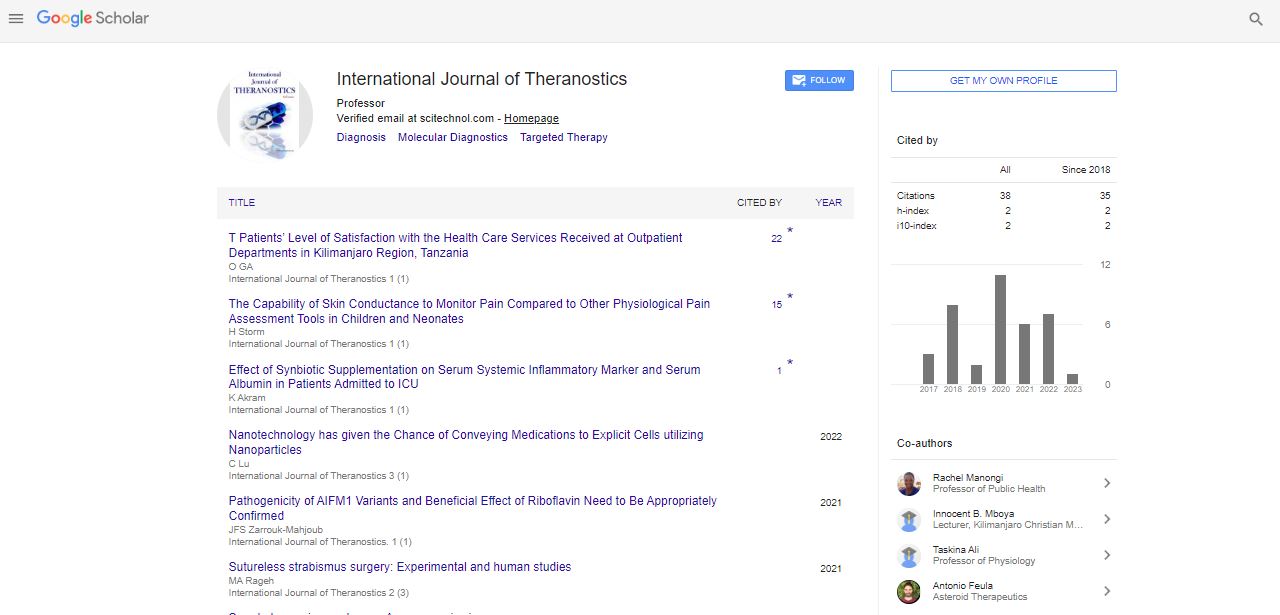Opinion Article, Int J Theranostic Vol: 12 Issue: 4
Innovating Theranostics: AI and Machine Learning for Advanced Data Analysis and Decision-Making
Aghanejad Shah*
1Research Center for Pharmaceutical Nanotechnology, Tabriz University of Medical Sciences, Tabriz, Iran
*Corresponding Author: Aghanejad Shah,
Research Center for Pharmaceutical
Nanotechnology, Tabriz University of Medical Sciences, Tabriz, Iran
E-mail: Shahaghanejady754798@gmail.com
Received date: 27 November, 2023, Manuscript No. IJT-23-124068;
Editor assigned date: 29 November, 2023, PreQC No. IJT-23-124068 (PQ);
Reviewed date: 14 December, 2023, QC No. IJT-23-124068;
Revised date: 21 December, 2023, Manuscript No. IJT-23-124068 (R);
Published date: 28 December, 2023, DOI: 10.4172/IJT.1000148.
Citation: Shah A (2023) Innovating Theranostics: AI and Machine Learning for Advanced Data Analysis and Decision-Making. Int J Theranostic 12:5.
Description
In the era of precision medicine, theranostics has emerged as a powerful approach that integrates diagnostics and therapeutics to provide personalized treatment strategies. Central to this paradigm shift is the incorporation of Artificial Intelligence (AI) and machine learning algorithms into the field, revolutionizing data analysis, diagnostics, and therapeutic decision-making. This essay explores the transformative role of AI and machine learning in theranostics, highlighting their impact on healthcare by enhancing the precision, efficiency, and individualization of patient care.
Theranostics relies on the analysis of vast and diverse datasets, encompassing genetic, clinical, imaging, and omics data. AI and machine learning algorithms excel in processing, integrating, and extracting meaningful patterns from these datasets. By leveraging these technologies, healthcare professionals can obtain comprehensive insights into a patient's molecular profile, disease progression, and treatment response, facilitating a more holistic understanding of individual health.
The application of AI and machine learning in diagnostics has significantly enhanced accuracy and efficiency. These algorithms can analyze complex patterns within medical images, genomic data, and clinical records to detect subtle anomalies that may escape human observation. In the context of theranostics, early detection of diseases such as cancer or neurodegenerative disorders is crucial for initiating timely interventions and improving patient outcomes.
The application of AI and machine learning in diagnostics has significantly enhanced accuracy and efficiency. These algorithms can analyze complex patterns within medical images, genomic data, and clinical records to detect subtle anomalies that may escape human observation. In the context of theranostics, early detection of diseases such as cancer or neurodegenerative disorders is crucial for initiating timely interventions and improving patient outcomes.
Radiomics and pathomics involve the extraction and analysis of quantitative features from medical images, providing valuable information about tissue characteristics and disease status. AI algorithms excel in identifying subtle patterns and correlations within these images, enabling more accurate diagnosis and prediction of treatment response. In oncology, for example, AI-driven radiomics plays a pivotal role in characterizing tumors and guiding personalized treatment strategies.
AI's application in neuroimaging has revolutionized the diagnosis and monitoring of neurological disorders. Machine learning algorithms can analyze structural and functional brain images to identify patterns associated with conditions such as Alzheimer's disease or multiple sclerosis. This aids in early diagnosis, tracking disease progression, and optimizing therapeutic approaches in neurology.
Interpreting genomic variants is a complex task, especially when assessing their clinical significance and relevance to disease. AI algorithms can sift through vast genomic datasets to identify relevant variants and predict their impact on health. This is particularly valuable in theranostics, where understanding the genetic basis of diseases is crucial for tailoring targeted therapeutic interventions. AI and machine learning models can generate predictive models based on genomic data, helping anticipate disease susceptibility, progression, and response to treatment. In theranostics, predictive modeling aids in selecting the most effective therapeutic interventions for individual patients, optimizing outcomes and minimizing adverse effects.
AI-driven clinical decision support systems analyze patient data, including medical history, genomic information, and treatment responses, to generate personalized treatment recommendations. These systems consider a multitude of factors and patterns, enabling healthcare professionals to make more informed decisions tailored to the individual patient's profile.
AI algorithms can stratify patients based on their risk profiles, predicting the likelihood of disease recurrence, complications, or adverse events. This risk stratification guides therapeutic decisionmaking by helping clinicians identify patients who may benefit from more aggressive interventions or personalized treatment plans.
AI and machine learning have accelerated drug discovery by analyzing vast datasets to identify potential drug candidates, predict their efficacy, and optimize their chemical structures. In theranostics, this approach facilitates the development of targeted therapies tailored to specific molecular signatures, offering more effective and personalized treatment options. Continuous monitoring of treatment response is crucial for adjusting therapeutic strategies in real-time. AI algorithms, integrated with data from various sources, can track treatment outcomes, identify early signs of resistance, and suggest modifications to optimize therapeutic efficacy.
AI and machine learning have accelerated drug discovery by analyzing vast datasets to identify potential drug candidates, predict their efficacy, and optimize their chemical structures. In theranostics, this approach facilitates the development of targeted therapies tailored to specific molecular signatures, offering more effective and personalized treatment options. Continuous monitoring of treatment response is crucial for adjusting therapeutic strategies in real-time. AI algorithms, integrated with data from various sources, can track treatment outcomes, identify early signs of resistance, and suggest modifications to optimize therapeutic efficacy.
The integration of AI and machine learning in theranostics relies heavily on access to vast amounts of patient data. Ensuring the privacy and security of this sensitive information is paramount, requiring robust data protection measures and adherence to ethical standards.
The "black box" nature of some AI algorithms poses challenges in terms of interpretability. Understanding how these algorithms arrive at specific conclusions is essential for gaining the trust of healthcare professionals and patients.
 Spanish
Spanish  Chinese
Chinese  Russian
Russian  German
German  French
French  Japanese
Japanese  Portuguese
Portuguese  Hindi
Hindi 